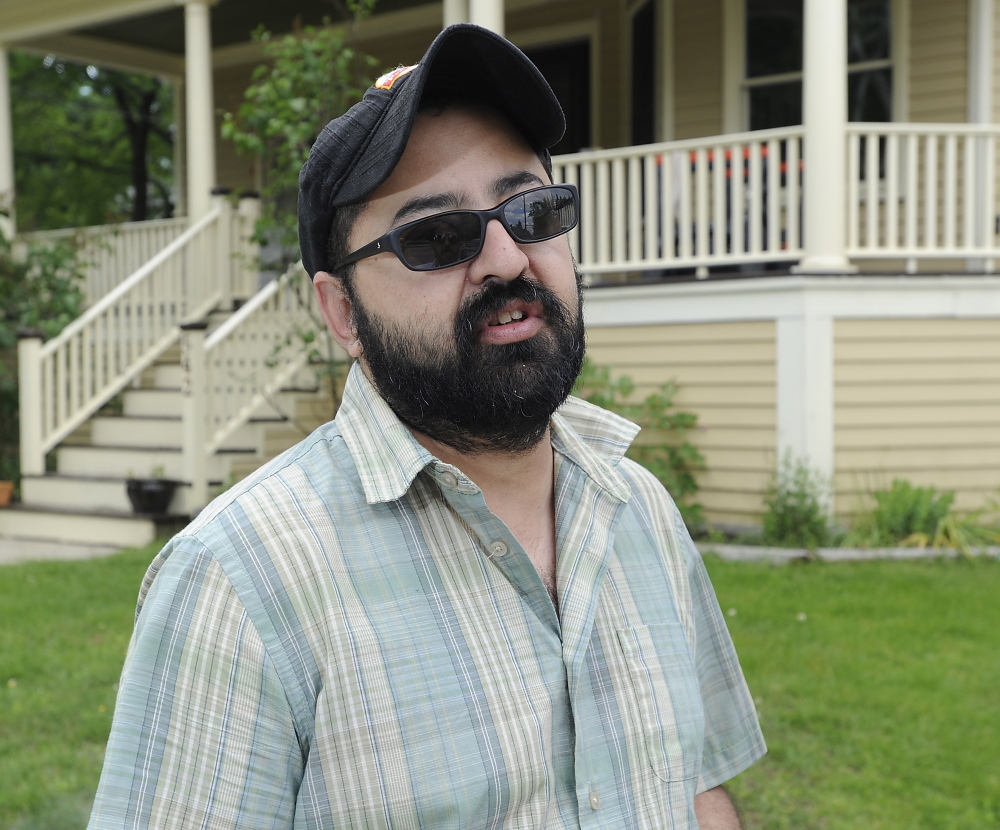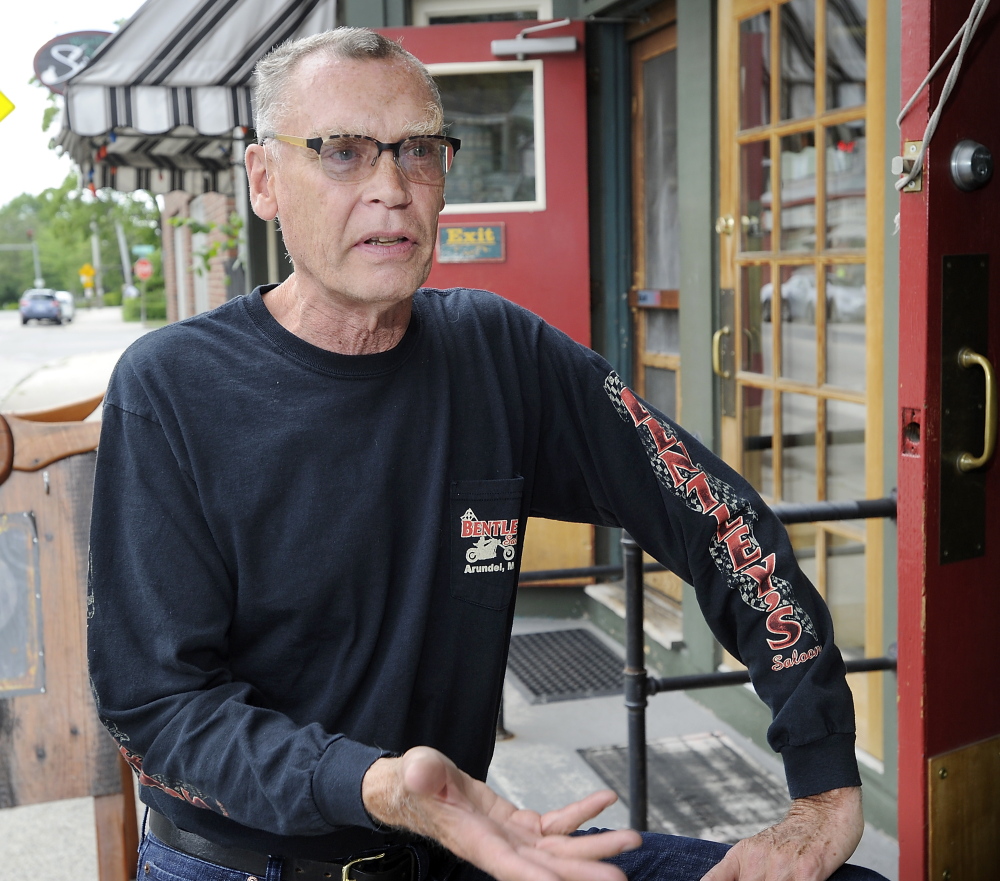The possibility that Portland taxpayers alone may be called upon to help the 900 or so asylum seekers who could lose emergency assistance for food and shelter is provoking a wide range of reactions on social media and, more important, in the city’s neighborhoods.
With a new fiscal year due to begin July 1, at issue is whether the city will continue to make up for General Assistance payments that the state has withheld for the past year if the state does not restore funding soon.
Philip Printz, 67, who owns a condominium on High Street, believes it is the state’s responsibility to help asylum seekers. But if aid is cut off, Portland taxpayers should pick up the slack, he said.
“Portland has made the decision to be a supportive community for immigrants,” Printz said while passing by Pat’s Meat Market on Stevens Avenue. “These people are here. They don’t want to stay on welfare. They want jobs. They want to learn the language. That’s why they’re here.”
Other Portland residents said they would really like to help, but there are limits on what they can afford to do.
Anne Salamone, a 52-year-old mother of six, has watched property taxes continually increase over the 28 years that she has lived in Deering Center. She believes Portland has developed a reputation as being too generous.
“As a human being, you feel their plight, but at some point you have to say enough is enough,” Salamone said. “At some point you have to be fiscally responsible.”
Provoking the reactions is a change to the state’s General Assistance program, which provides vouchers for basic necessities such as rent, food, clothing and medication. The costs of the program are shared by the state and local municipalities.
Asylum seekers and other legal non-citizens were eligible to receive General Assistance until last June, when Gov. Paul LePage told municipalities that the state would no longer provide reimbursements for these individuals. The city of Portland decided to make up the difference through the end of this month.
The LePage administration’s move was based on a 1996 federal law that prohibits asylum seekers from receiving state and local benefits unless the state legislature enacts a law explicitly allowing it. A Superior Court judge recently ruled that Maine has not passed such a law and the administration was within its rights to withhold funding for these groups, even though the judge admonished the administration for circumventing the process and for its rhetoric.
Immigration advocates are making a last-ditch effort to restore assistance for asylum seekers at the state level. Even though an amendment to the state budget failed, a recent stand-alone bill that would restore assistance but place a 24-month cap on benefits passed the Republican-controlled Maine Senate by a 29-5 vote.
The bill now moves to the House of Representatives, where Republicans are hungry for welfare reform. The Democratic-controlled House tabled the bill Friday, a move that will allow supporters, including church groups, more time to try to persuade House Republicans to support the bill.
Meanwhile, the Portland City Council is expected to vote Wednesday on a $221.8 million budget proposal, which already contains a 2.9 percent property tax rate increase – from $20 per $1,000 of valuation to $20.58.
The council has been under pressure to continue providing aid in the event the state decides not to restore funding. Adding another $4 million to $5 million to the budget would increase property taxes on a $200,000 house by an estimated $130 per year in addition to the current proposed increase of $116 on that same home.
COMMENTS ON SOCIAL MEDIA
Some commenters on social media describe asylum seekers as “illegal,” even though most came here legally and are following an established process to seek safety from a violent homeland. The commenters say asylum seekers should “get a job,” even though federal law prohibits them from working for at least six months.
Others believe it is up to the nonprofit groups and churches “who bring them here” to help, even though asylum seekers come to Maine on their own, unlike refugees, who are part of a formal resettlement program run by Catholic Charities Maine.
But among the comments are passionate pleas from people who want to help those who have fled unthinkable violence to seek a better life, not only in the U.S., but in Maine. One Brunswick woman offered to sponsor an asylum family, while a stained-glass artist in Boothbay offered to send the city of Portland a check.
Meanwhile, the entire debate prompted dismay from one Portland resident.
“Sweet lord,” Robert Alan Parry said in a Facebook post. “Rather unsettling to see how compassion has died in the great state of Maine just based on these comments.”
NEIGHBORS SPEAK OUT
Bilal Rasheed, 41, rents an apartment on Stevens Avenue, where he lives with his wife and two children. He is looking to purchase a home in Portland and is not concerned with the additional property taxes, even though it could lead to higher rents.
Rasheed was born in the U.S., but his parents emigrated from Pakistan to New Jersey in 1969, before settling down in Texas. Although his parents never relied on assistance, he believes that safety net is needed for others.
“One of the things I love about Portland is the diversity,” Rasheed said in an interview. “America is the best country in the world and I don’t ever want to take that for granted. (We should do) anything we can to help people coming in (to the U.S.) experience that dream.”
Other residents want to get creative. Erlene Stuart, who lives in Stroudwater, thinks that someone ought to start a GoFundME page, so people who have the means and inclination can help.
“I think it’s a statewide issue and not just the city of Portland issue,” Stuart said. “If it was a GoFundME, it would be a wider audience and not just the taxpayers of Portland.”
Stuart, who said she is over 65, noted that she and her husband frequently talk about selling their home on Brewer Street and moving out of the neighborhood in which she has lived for 40 years and where she raised three children. She said it’s becoming too expensive to live in Portland – not only are property taxes going up, but so are the cost of trash bags and shopping bags. Soon the city will implement a fee on stormwater runoff.
She opposes using property tax dollars to provide aid because she fears that costs would only increase in the coming years.
“In my personal opinion, it seems Portland wants to say ‘yes’ to everything and they can’t do that – the people can’t afford any more,” Stuart said.
Some residents, like Daniel Foster, who owns a home near Nason’s Corner on Warwick Street, are torn. The self-described Rockefeller Republican is fiscally conservative, so he doesn’t support adding asylum seekers to the tax rolls. However, he’s socially liberal, so he doesn’t want to throw people out on the streets.
“I’m not unsympathetic to these people at all because of their background,” Foster said. “They have a lot to contribute. We just can’t afford it.”
Foster says Portland should continue to offer assistance to those who are currently getting it for an additional six months and then stop when they are able to work.
He said he was surprised to learn there were so many asylum seekers in Portland. He believes city leaders ought to find a way to reduce the number of people coming for help, because housing is already scarce and property taxes are too high.
“You can’t pull the rug out, but it’s telling me that people like the mayor have no plans to stop the influx,” said Foster, who works several jobs to make ends meet. “I think the taxes are crazy. They keep going up every year. There are a lot of us out here who are self-employed and we don’t get raises every year.”
Send questions/comments to the editors.




